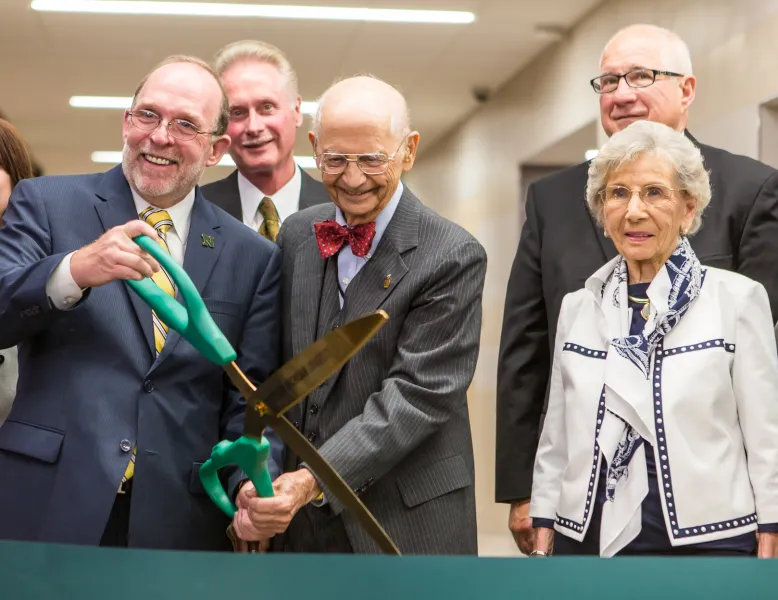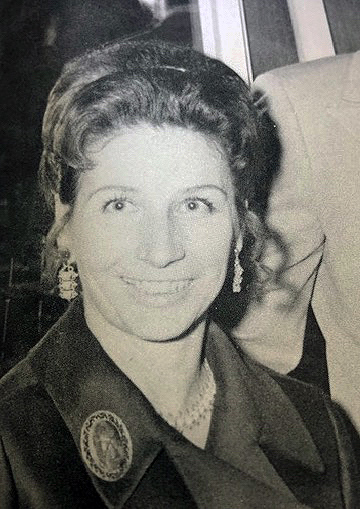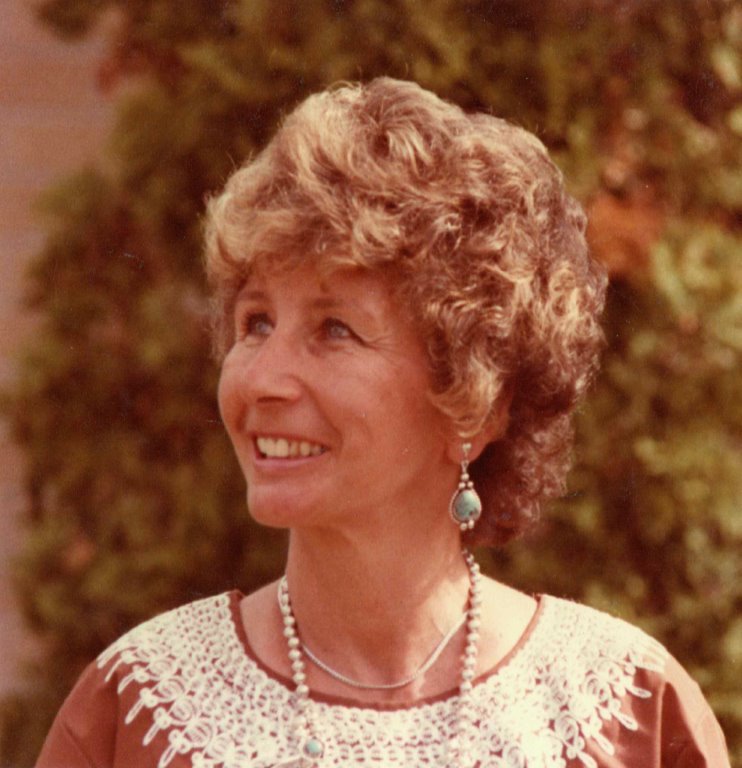June Jamrich, who was a visible presence on campus and in the community during her husband John X. Jamrich's tenure as Northern's president from 1968-1983, passed away April 20 at her home in Jacksonville, Fla. She was 95.
In a transcribed oral history interview, June described some of the projects she engaged in while at Northern. She was committed to involving students in activities that would strengthen their social connections and networking skills while expanding their horizons. She was among college and university “First Ladies” nationwide who sought a more substantive purpose when they accompanied their husbands to annual meetings. She even served as instructor of figure skating—the first president's wife employed in such a capacity by the university since Minnie Waldo (1899-1903).
NMU President Fritz Erickson sent an email notification of her death to the campus community. He said he first met June shortly after he was appointed, when the couple returned to campus for the dedication of the new Jamrich Hall.
“I've had the great opportunity to spend time with June and John on their summer trips to Marquette and during my visits to Florida for alumni events,” Erickson said. “I came to know June as an exceptionally bright, compassionate and witty woman—someone I really enjoyed getting to know. She, like John, bled green and gold. She kept up regularly on what was happening at Northern. She loved Northern Michigan University and cared deeply about the students, faculty, staff, alumni and retirees. She will be missed by those of us who were lucky to know her.”
June was born in Kenosha, Wis. After graduating from Mary Bradford High School, she enrolled at Russell Sage College in Troy, N.Y. She joked that she had known her husband all her life because their families knew each other and regularly traded visits to their respective towns. It was during her sophomore year in college that she became engaged to John, who at that time was stationed with the U.S. Air Force in Fairbanks, Alaska.
“I went to a women's school and this was in 1943,” she said during the 1997 oral history interview with NMU historian Russell Magnaghi. “Married women were not allowed at Russell Sage College, so that was a big a problem if I wanted to get married and go back to school, I had to find out whether or not this was possible because things do change. I called Dean Crocket and I explained situation: ‘I am preparing to get married to a military man, I cannot go to base with him but I would like to be able to return to Sage. I heard a chuckle at the other end of the line. Dean Crocket said, ‘June, you're the fourth young woman who has called to ask for that policy to be changed, and so I will just have to say best wishes to you and congratulations to your fiancé, and we'll see you in the fall!'”
When the couple traveled to Cedar Rapids, Iowa, for John's first paid job as Dean of Students at Coe College, they started a family that eventually expanded to three daughters: June, Marna and Barbara. It was there that June said she began to cultivate an effective rapport with students through frequent interactions and made an effort to involve them in activities. She carried those qualities to Marquette when John accepted the presidency at Northern after serving as associate dean of the College of Education at Michigan State.
“I have them invited to the home; we have dinners just with the president and myself,” she said. “I involve them in some of the receptions that we have, some of the small dinners that we have at the University Center. I like to see, at some of those dinners, a student who is sitting next to the mayor of Marquette, sitting next to a faculty member, or maybe sitting next to our honorary degree recipient. I think this really expands his horizons and this is the kind of thing I like to do. I have ‘K House' open for organizations to hold special activities. They know that they can count on me for whatever it is that they need.”
Another of her projects was related to Northern's membership in the Association of State Colleges and Universities (ASCU). Presidents from all over the country would meet annually in a designated city to discuss the latest trends in education, financial aid issues and other substantive topics. June said “the wives” were invited to accompany them, often going to fashion shows, tea parties and tourist landmarks. But one year over coffee, she said the women developed a greater sense of purpose.
“We said, ‘Why are we here? We're really not accomplishing anything,'” she recalled. “We have all of these women who have all of these experiences and we should be learning from each other. We should be having the same types of programs that the men have. When we went home, we sent letters back and forth and found that we could do this. We could have rooms parallel to the men and that we could set up topics to talk about.
“I was really proud to think that they asked me to be one of the first panelists. But I think it's interesting to hear what some of the topics were with all of these women who were from all different walks of education; of education life, I guess I should say. One of the topics was, naturally, what is the role of the first lady? How do I find time for my family? How can I pursue my career? Now, you have to remember this was [in the 1970s]. We didn't have a lot of women attorneys or women doctors in those days.”
June also eagerly accepted a request to teach figure skating, after the instructor at the time suffered a broken leg and was unable to finish out the semester.
“Well of course, I was overjoyed. I said I would love to do it because, as everyone knew, I loved ice skating and I had taken lessons when we were at Michigan State University.”
John X. Jamrich's presidency kicked off during a contentious period throughout the country. The Vietnam War, latter stages of the civil rights movement and the Kent State shootings sparked student protests and sit-ins at NMU and other campuses. June recalls many students showing up on the lawn of the original “K House” to expedite a request for two days off to process the Kent State shootings and memorialize the victims. Some planned to sleep outside overnight.
“Some of them didn't have sleeping bags, some of them were just going to sleep on the ground,” she said. “So I went out and said to two or three students, ‘Come in the house. I don't want you to catch cold for something like this. I don't mind you sleeping out on the lawn if that's what you want to do, fine, but let me give you something to nibble on and let me give you some hot tea.' There was a student who took the cup of tea and sat it down on the table. The next thing he did was take his hat off, throw it down on the floor and stomp on it as he said, ‘How can I do a protest when the president's wife treats me like my mother!?' There were three or four people who slept on that lawn with warm tea in their tummies, and by dawn, there wasn't anyone left.”
June said she felt fortunate to be able to meet two presidents, five governors, two ambassadors, two Nobel Prize winners and actors/entertainers during her years at Northern.
“In retrospect, I'm really amazed that a small-town girl had the opportunity and the privilege to meet so many wonderful people in the community, in the university community, and in people that we entertained who came in for honorary degrees and such. I was privileged to live in a wonderful community that was accepting of us and supportive of us from the years 1968 to 1983, as the first lady of Northern Michigan University, Marquette, Michigan. For that, I'll always be deeply grateful and deeply honored.”
June and John retired to Florida, but according to her obituary, her most fond memories were of their time spent in Marquette and at NMU. Her obituary can be viewed here.



